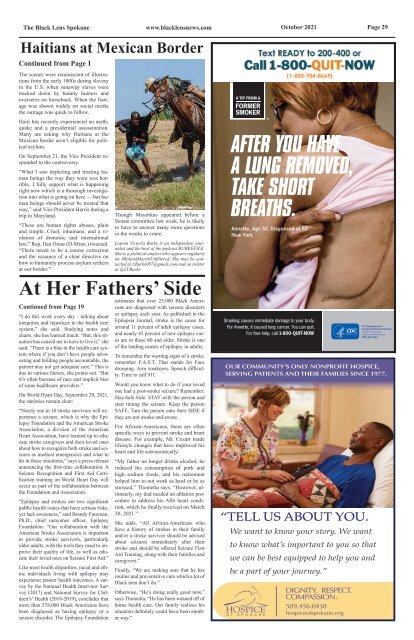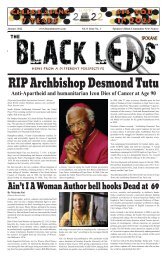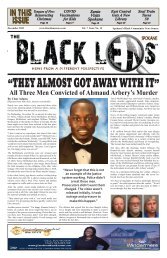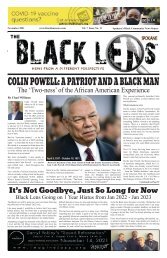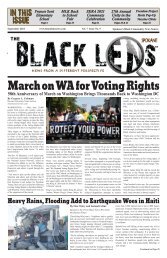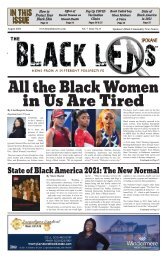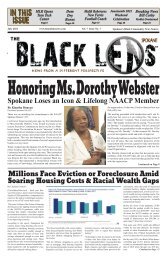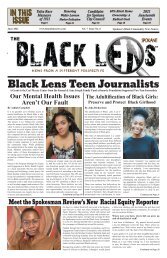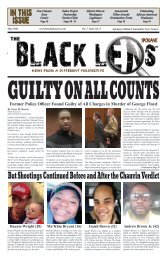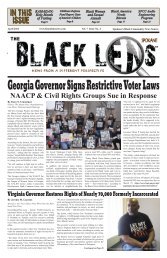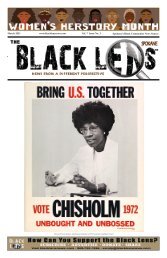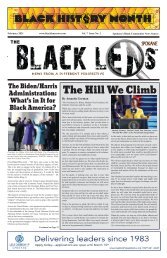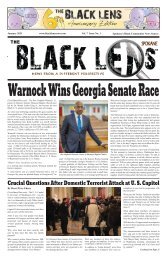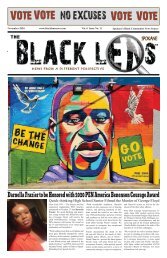Black Lens - October 2021
The Black Lens in an independent , community newspaper, published monthly and based in Spokane, WA, that covers then news, people, information and issues that are of importance to the Black community.
The Black Lens in an independent , community newspaper, published monthly and based in Spokane, WA, that covers then news, people, information and issues that are of importance to the Black community.
You also want an ePaper? Increase the reach of your titles
YUMPU automatically turns print PDFs into web optimized ePapers that Google loves.
The <strong>Black</strong> <strong>Lens</strong> Spokane<br />
Haitians at Mexican Border<br />
Continued from Page 1<br />
The scenes were reminiscent of illustrations<br />
from the early 1800s during slavery<br />
in the U.S. when runaway slaves were<br />
tracked down by bounty hunters and<br />
overseers on horseback. When the footage<br />
was shown widely on social media<br />
the outrage was quick to follow.<br />
Haiti has recently experienced an earthquake<br />
and a presidential assassination.<br />
Many are asking why Haitians at the<br />
Mexican border aren’t eligible for political<br />
asylum.<br />
On September 21, the Vice President responded<br />
to the controversy.<br />
“What I saw depicting and treating human<br />
beings the way they were was horrible.<br />
I fully support what is happening<br />
right now which is a thorough investigation<br />
into what is going on here — but human<br />
beings should never be treated that<br />
way,” said Vice President Harris during a<br />
trip to Maryland.<br />
“These are human rights abuses, plain<br />
and simple. Cruel, inhumane, and a violation<br />
of domestic and international<br />
law,” Rep. Ilan Omar (D-Minn.) tweeted.<br />
“There needs to be a course correction<br />
and the issuance of a clear directive on<br />
how to humanely process asylum seekers<br />
at our border.”<br />
Continued from Page 19<br />
“I do this work every day - talking about<br />
inequities and injustices in the health care<br />
system,” she said. Studying notes and<br />
charts, she has learned much. “But, this situation<br />
has caused me to have to live it,” she<br />
said. “There is a bias in the health care system<br />
where if you don’t have people advocating<br />
and holding people accountable, the<br />
patient may not get adequate care.” This is<br />
due to various factors, she points out. “But<br />
it’s often because of race and implicit bias<br />
of some healthcare providers.”<br />
On World Heart Day, September 29, <strong>2021</strong>,<br />
the statistics remain clear:<br />
“Nearly one in 10 stroke survivors will experience<br />
a seizure, which is why the Epilepsy<br />
Foundation and the American Stroke<br />
Association, a division of the American<br />
Heart Association, have teamed up to educate<br />
stroke caregivers and their loved ones<br />
about how to recognize both stroke and seizures<br />
as medical emergencies and what to<br />
do in these situations,” says a press release<br />
announcing the first-time collaboration. A<br />
Seizure Recognition and First Aid Certification<br />
training on World Heart Day will<br />
occur as part of the collaboration between<br />
the Foundation and Association.<br />
“Epilepsy and strokes are two significant<br />
public health issues that have serious risks,<br />
yet lack awareness,” said Brandy Fureman,<br />
Ph.D., chief outcomes officer, Epilepsy<br />
Foundation. “Our collaboration with the<br />
American Stroke Association is important<br />
to provide stroke survivors, particularly<br />
older adults, with the tools they need to improve<br />
their quality of life, as well as educate<br />
their loved ones on Seizure First Aid.”<br />
Like most health disparities, racial and ethnic<br />
individuals living with epilepsy may<br />
experience poorer health outcomes. A survey<br />
by the National Health Interview Survey<br />
(2017) and National Survey for Children’s’<br />
Health (2018-2019), concludes that<br />
more than 578,000 <strong>Black</strong> Americans have<br />
been diagnosed as having epilepsy or a<br />
seizure disorder. The Epilepsy Foundation<br />
www.blacklensnews.com <strong>October</strong> <strong>2021</strong><br />
Page 29<br />
Though Mayorkas appeared before a<br />
Senate committee last week, he is likely<br />
to have to answer many more questions<br />
in the weeks to come.<br />
Lauren Victoria Burke is an independent journalist<br />
and the host of the podcast BURKEFILE.<br />
She is a political analyst who appears regularly<br />
on #RolandMartinUnfiltered. She may be contacted<br />
at LBurke007@gmail.com and on twitter<br />
at @LVBurke<br />
At Her Fathers’ Side<br />
estimates that over 25,000 <strong>Black</strong> Americans<br />
are diagnosed with seizure disorders<br />
or epilepsy each year. As published in the<br />
Epilepsia Journal, stroke is the cause for<br />
around 11 percent of adult epilepsy cases,<br />
and nearly 45 percent of new epilepsy cases<br />
are in those 60 and older. Stroke is one<br />
of the leading causes of epilepsy in adults.<br />
To remember the warning signs of a stroke,<br />
remember F.A.S.T. That stands for Face<br />
drooping. Arm weakness. Speech difficulty.<br />
Time to call 911.<br />
Would you know what to do if your loved<br />
one had a post-stroke seizure? Remember:<br />
Stay.Safe.Side. STAY with the person and<br />
start timing the seizure. Keep the person<br />
SAFE. Turn the person onto their SIDE if<br />
they are not awake and aware.<br />
For African-Americans, there are often<br />
specific ways to prevent stroke and heart<br />
disease. For example, Mr. Cozart made<br />
lifestyle changes that have improved his<br />
heart and life astronomically.<br />
“My father no longer drinks alcohol, he<br />
reduced his consumption of pork and<br />
high sodium foods, and his retirement<br />
helped him to not work as hard or be as<br />
stressed,” Thometta says. “However, ultimately,<br />
my dad needed an ablation procedure<br />
to address his Afib heart condition,<br />
which he finally received on March<br />
30, <strong>2021</strong>.”<br />
She adds, “All African-Americans who<br />
have a history of strokes in their family<br />
and/or a stroke survivor should be advised<br />
about seizures immediately after their<br />
stroke and should be offered Seizure First<br />
Aid Training, along with their families and<br />
caregivers.”<br />
Finally, “We are making sure that he has<br />
routine and preventative care which a lot of<br />
<strong>Black</strong> men don’t do.”<br />
Otherwise, “He’s doing really good now,”<br />
says Thometta. “He has been weaned off of<br />
home health care. Our family realizes his<br />
situation definitely could have been another<br />
way.”<br />
AFTER YOU HAVE<br />
A LUNG REMOVED,<br />
TAKE SHORT<br />
BREATHS.<br />
Annette, Age 57, Diagnosed at 52<br />
New York<br />
Smoking causes immediate damage to your body.<br />
For Annette, it caused lung cancer. You can quit.<br />
For free help, call 1-800-QUIT-NOW<br />
OUR COMMUNITY’S ONLY NONPROFIT HOSPICE,<br />
SERVING PATIENTS AND THEIR FAMILIES SINCE 1977.<br />
“TELL US ABOUT YOU.<br />
We want to know your story. We want<br />
to know what’s important to you so that<br />
we can be best equipped to help you and<br />
be a part of your journey.”<br />
DIGNITY. RESPECT.<br />
COMPASSION.<br />
509.456.0438<br />
hospiceofspokane.org


